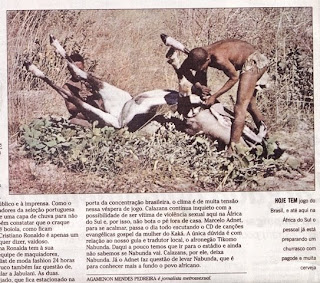20 million people suffered because Bob Bradley didn't get his tactics right. The same sorry scene from 2006 repeated itself. USAmerican defensive central midfielder gets caught in possession with a crunching tackle from a bigger, faster, stronger player (Reyna, 2006; Clark 2010), goal for Ghana. From there, Bradley was forced to change Clark for Edu and the game turned in favor of the Yanks. The second change, Feilhaber for Findley, should have happened the day before, not at halftime. The third change, Gomes for Altidore, was completely absurd as the USA lost physical presence in the box. Oh well. The Yanks earned a lot of respect here in Brazil for their raça e garra. Look for the USA to be based in the north of Brazil for the 2014 WC, probably Manaus or Fortaleza, places that have direct flights from the East Coast.
At the FFF, the Mexican fans outnumbered the Argentines.Geographically, that didn't make any dang sense at all. Following more general football logic, the vast majority of the 10,000 strong crowd were pulling for Mexico. Every time Maradona's face showed on the screen the guy next to me would scream "Pelé". He would also scream "Maricón" at every opporutnity, the equivalent of yelling "faggot". His probably learned the word from watching this commercial for Skol, one of Brazil's many interpretations of Bud Light.
Everyone agrees that Tevez's first goal was offside. But what about that pass from Messi? As the ball was floating ever so gently on to Carlitos' offside head, Messi was indicating with his own head that Tevez should head it home. It was as if Messi was passing the ball to himself. Even playing poorly, Messi is a destabilizing factor. The same could be said for Higuain, who continues to destabilize me because he is so out of form. Yet he continues to score goals. Unfortunately for Argentina his continued inclusion (and the whirling dervish defending of Heinze, plus getting overwhelmed in a three man midfield) will not cut it against Germany. Pity that.
When Brazil plays in the World Cup, everyone in the country takes the afternoon or morning off. They should take the whole day because going to work dressed in yellow and getting back home with everyone else at the same time causes an incredible amount of traffic chaos. Heading north from the center yesterday on the Metro was not for the claustrophobic. Within three stops, a totally empty train filled to the point where I literally could not move my arms. The air conditioning had no effect. There was no point in holding on to anything because there was nowhere to move. Were there an accident, everyone would die. With so much extra weight, do the brakes still work? The train lurched around curves. In order to get out of the car, I had to slither and push and squirm before being shot onto the platform like a watermelon seed out of a slippery mouth. Many tens of thousands listened to the first half in their cars, paralyzed.
Kaká's first involvement in the game was positive, so I settled in for a Chilean loss. The pace of the game was extraordinary. Brazil did not leave any time on the ball for the Chilean midfield and the technical superiority of Alves, Ramirez, Kaká, and Robinho won the day. It's hard to take a football off a Brazilian, which in turn makes for very few opportunities to counterattack, which contributes to defensive stability. Forced to chase the game after a well-taken corner, Chile opened up, leaving a 3v3 situation with Robinho, Kaká, and Luis Fabiano running at speed. Game over.
3-0 was a fair result. Unfair were the interviews with Kaká's mom and grandmother during halftime and after the game. A perpetual state of forced ignorance of what actually happened during the game is shoved down the collective throat by OGlobo. The presentation perpetuation of Kaká as some kind of capital-religious-footballing superhero that embodies the best virtues of Brazilian-ness continues to make me sick. There's some dirty, dirty stuff going on with that lad with very open fights between him and Juca Kfuri in the Brazilian media.
My general sense of Brazilian fandom in relation to the national team is that people would much rather see their club teams win than the seleção. The CBF has done a wonderful job of distancing the team from the people. The vast majority of people I know have never seen the seleção play in person, nor are they likely to see them. 20 of the 23 Brazilian players in the World Cup ply their trade abroad, so there's no identification with them as local or even national figures. Of course, everyone is happy to see the team win, but it's kind of like cheering for the USA Basketball team in the Olympics. The win is expected, there's low emotional investment because of the general lack of tension, so why not use the opportunity of the game to party with friends and family? The social role of the seleção and the World Cup is much more profound than I had imagined, full of the contradictions and coherencies that make this such a fascinating place to live.









